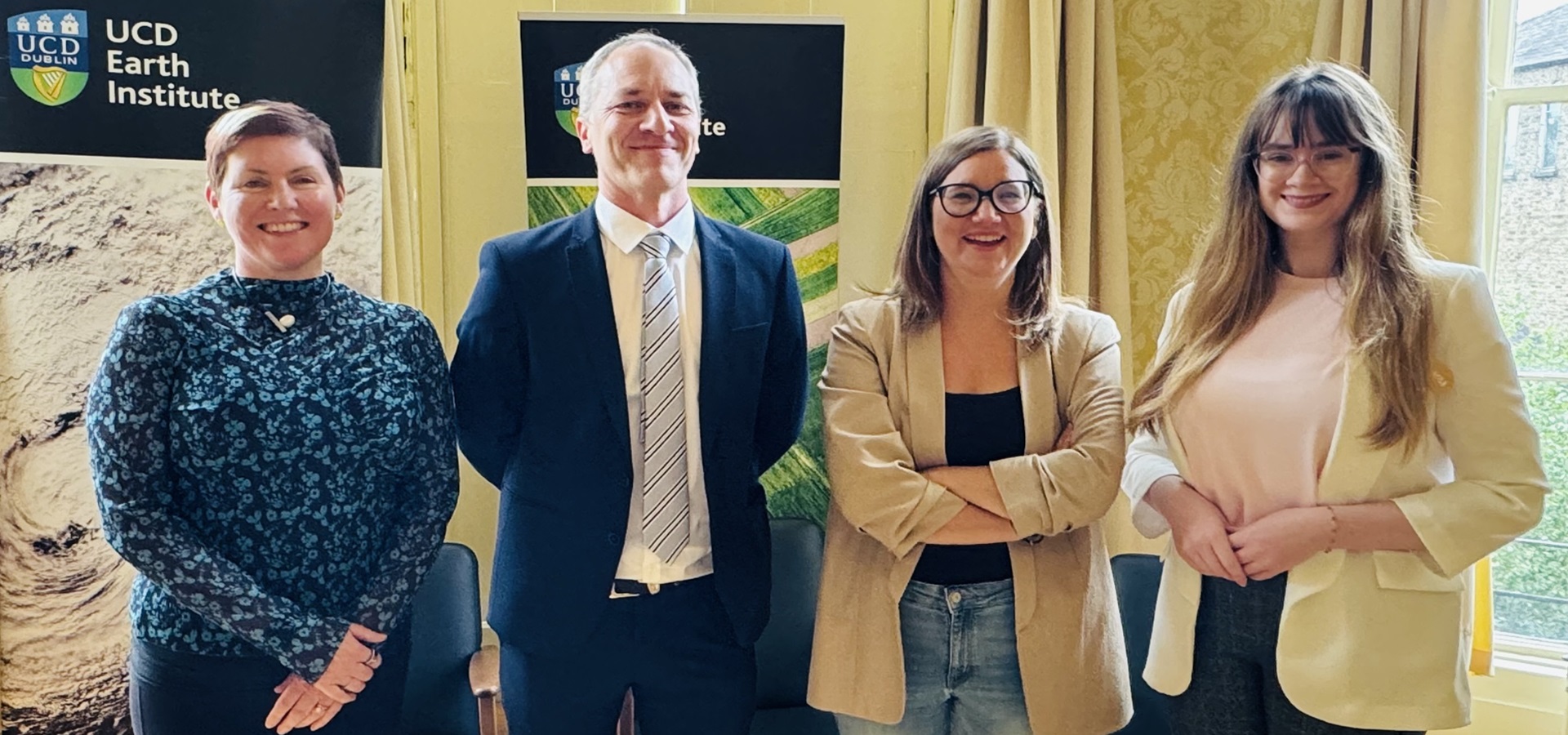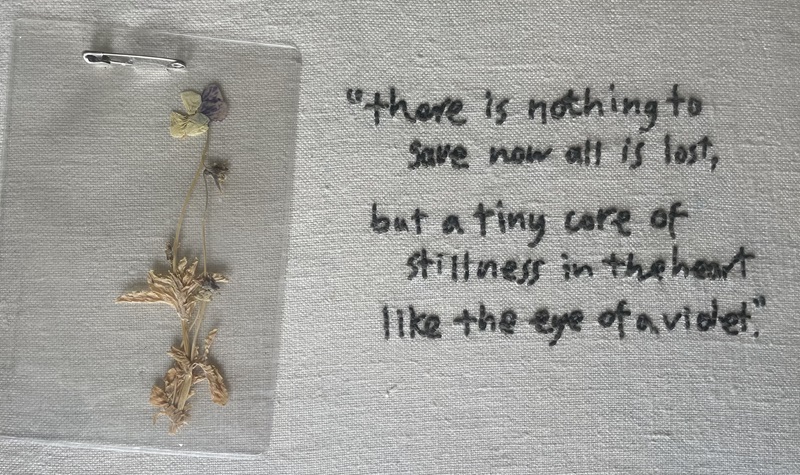Irish Citizens Assembly on Biodiversity Loss 2023 report
In May 2023, Dr Aoibhinn Ní Shuilleabhain, Chair of the Citizens Assembly on Biodiversity Loss, discussed the process of the Citizens' Assembly on Biodiversity Loss, as part of the Teagasc Signpost series joined by Mark Gibson, Head of Teagasc Outreach & Innovation and Catherine Keena, Countryside Management Specialist, Teagasc..
In April 2023, the Irish Citizens' Assembly on Biodiversity Loss released its long-awaited report, which highlights the urgent need for action to protect and restore Ireland's biodiversity and have the potential to dramatically transform Ireland's relationship with the natural environment. The report is the result of a process involving ninety-nine Irish citizens, selected to ensure membership is as broadly representative of Irish society as possible. The Assembly heard from experts including UCD’s Tasman Crowe, Mary Kelly-Quinn, Helen Sheridan, Elva Johnston as well as stakeholders and the general public before voting on a series of propositions that were the culmination of careful deliberation and debate.
The report includes 159 recommendations including 73 high-level recommendations and 86 sectoral specific actions and priorities across six themes, agriculture, forestry, marine, urban areas, biodiversity awareness, and policy and governance. These recommendations emerged from the Assembly’s recognition that “biodiversity has an intrinsic value that should be recognised and that the essential ecosystem services it provides will be impossible to replace.”
Central to the report’s recommendations is the need for the State to take prompt, decisive, and urgent action to address biodiversity loss and restoration and to provide leadership in protecting Ireland’s biodiversity for future generations with fundamental changes to the funding, implementation and enforcement of national policies, EU biodiversity-related laws and relevant directives.
The Assembly makes clear their disappointment in the notable absence of adequate State funding and support for policies and legislation to prevent biodiversity loss and restore Ireland’s natural heritage: “the State has comprehensively failed to adequately fund, implement, and enforce existing national legislation, national policies, EU biodiversity-related laws and directives related to biodiversity. This must change.”
The Assembly recommends that the government should develop a biodiversity strategy that includes a target to halt biodiversity loss by 2030 and that biodiversity should be integrated into all policy areas. “The number of recommendations speaks to the scale and breadth of the problem,” said Assembly Chair and UCD Assistant Professor in the School of Mathematics & Statistics Aoibhinn Ni Shuilleabhain.
The report highlights the critical role of agriculture in maintaining and enhancing biodiversity in Ireland, recommending that the government should develop a biodiversity-friendly farming program that rewards farmers for biodiversity-friendly practices. The report also calls for the promotion of sustainable forestry practices and increased protection for Ireland's marine habitats.
The Assembly recognises the roles that local leadership, local communities and the activities of Non Governmental Organisations (NGO) play in assisting the State in addressing the biodiversity crisis and how these must be actively developed and resourced. In particular, the Assembly highlighted the role urban areas can play in supporting biodiversity, and recommends that local authorities should prioritise the creation of green spaces and wildlife corridors. The report also emphasises the need for public education and awareness-raising to increase understanding and support for biodiversity conservation.
Commenting on the report, Tasman Crowe, Director of the UCD Earth Institute and member of the Biodiversity Citizens' Assembly Expert Advisory Group, stated, "This report is an important contribution to the urgent and ongoing dialogue around biodiversity conservation in Ireland. The Citizens' Assembly has made clear that biodiversity loss is not just an environmental issue, but a social and economic issue too. The report highlights the importance of taking a whole-of-government approach to biodiversity conservation and provides a roadmap for how Ireland can tackle the biodiversity crisis."
Mary Kelly-Quinn from the UCD School of Biology and Environmental Science gave an expert presentation to the Assembly on the importance of freshwater ecosystems and the pressures on water quality and biodiversity. “Fresh water has been described as the lifeblood of human civilisation flowing in the streams the capillaries and the rivers the veins of the Earth's circulatory system and just like our own circulatory system we need to keep it healthy if it is to provide or if it is to function properly and provide all of the goods and services so-called ecosystem services that we depend on from fresh waters” including water purification, regulation of temperature, and biodiversity appreciation.
Mary highlighted freshwater ecosystems and related biodiversity as being among the most threatened ecosystems on Earth, with the Living Planet report highlighting an 83 percent decline in freshwater biodiversity since the 1970s and wetlands, which are important for water purification and carbon sequestration, disappearing at rates three times faster than forests. Mary emphasised the scale and urgency of the system and policy changes needed to combat the loss of freshwater ecosystems and related biodiversity loss, “We are at a tipping point and if we go beyond this it will be practically impossible to reverse the decline in water quality and biodiversity loss.”
The Citizens' Assembly on Biodiversity Loss was established in 2021 by the Oireachtas Joint Committee on Climate Action, with the aim of engaging citizens in the debate around biodiversity conservation. The Assembly was modelled on the successful Citizens' Assembly on Climate Change, which was held in 2016-2018 and led to the development of Ireland's Climate Action Plan.
The report of the Citizens' Assembly on Biodiversity will now be considered by the Oireachtas Joint Committee on Climate Action, which will make recommendations to the government. It is hoped that the report will lead to significant policy changes to support biodiversity conservation in Ireland and beyond.
Contributions from UCD
Dr Helen Sheridan (UCD School of Agriculture & Food Science) on General interactions between agriculture and biodiversity
Dr Elva Johnston (UCD School of History) on Brehon Law & Ireland's traditions looking to / after the environment
Professor Mary Kelly Quinn (UCD School of Biology and Environmental Science) on High Level Overview - Water Quality and Biodiversity Pressures in Ireland's Freshwaters
Professor Tasman Crowe (UCD School of Biology and Environmental Science) on Ecology - A Brief Introduction to Ecological Concepts & Main Threats:
Introductions by Dr Aoibhinn Ni Shuilleabhain (UCD School of Mathematics & Statistics):

